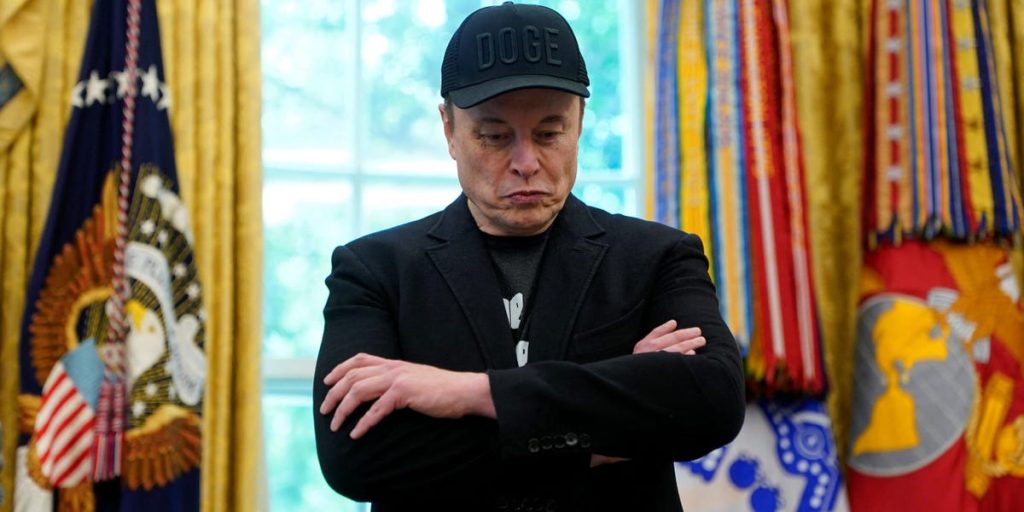Tesla is facing a pivotal shareholder meeting.
On November 6, the EV maker will hold its annual meeting, where investors will vote on issues concerning the company’s future direction and the performance of its CEO, Elon Musk.
The meeting comes as the company navigates a year marked by political controversies and struggling sales. Tesla’s board also decided to exclude at least 11 shareholder proposals that focus on accountability and sustainability.
Although Tesla shares have largely recovered from the losses experienced between March and August, and the end of the EV tax credit boosted third-quarter vehicle sales, many investors have questions regarding Musk’s leadership and the company’s spending on AI.
From Musk’s proposed $1 trillion pay package to an investment in xAI, here is what’s at stake for Tesla and Musk at Thursday’s shareholder meeting.
Tesla did not immediately respond to a request for comments.
The $1 trillion question
The battle over Musk’s record-setting $1 trillion pay package has escalated into one of the most high-stakes corporate showdowns in years.
Tesla’s chair, Robyn Denholm, warned shareholders in a letter in October that Musk could walk away from the company if they fail to approve the plan at Tesla’s annual meeting next week. In her letter, Denholm said it comes down to whether shareholders still want to “retain Elon as Tesla’s CEO and motivate him” to make Tesla “the leading provider of autonomous solutions and the most valuable company” in the world.
Related stories
The proposed pay package, potentially worth up to $1 trillion over the next decade, was introduced after a Delaware judge struck down Musk’s previous $56 billion compensation plan twice. The judge wrote in the ruling that Tesla’s board had been unduly influenced by Musk when it approved that 2018 deal, which was then the largest executive pay award in corporate history. As Tesla continues to appeal the judge’s decision, Musk has remained without compensation.
To unlock the full payout, Musk must hit a series of ambitious milestones. According to Tesla’s filings with the Securities and Exchange Commission, the goals include raising Tesla’s market capitalization to $8.5 trillion by 2035, selling 12 million vehicles annually, deploying one million robotaxis, and producing one million “AI bots.” If successful, his stake in the company would grow from 13% to at least 25%.
The proposed pay package is a source of controversy among investors. Proxy advisory firms ISS and Glass Lewis have both urged shareholders to reject the proposal, arguing that it grants Musk excessive power with too little oversight. Meanwhile, Musk fired back, calling the firms “corporate terrorists” during Tesla’s third-quarter earnings call.
“I just don’t feel comfortable building a robot army here and then being ousted because of some asinine recommendations,” Musk said.
Investing in xAI
As Tesla pushes deeper into robotics and AI, Musk wants shareholders to agree to an investment in his AI startup, xAI.
Musk had previously commented on X that if it were up to him, Tesla “would have invested in xAI long ago.”
Founded in July 2023, xAI has rapidly become one of Musk’s most valuable ventures. The company, which develops the Grok chatbot integrated into X, has raised over $12 billion across multiple funding rounds and was valued at about $50 billion in 2024.
In March, Musk announced that xAI had acquired X in an all-stock deal, valuing xAI at $80 billion and X at $33 billion. Musk’s rocket company, SpaceX, had also announced plans earlier in the year to invest $2 billion into xAI.
Musk owns Tesla, SpaceX, Neuralink, and The Boring Company, and many have dubbed his series of connected ventures the “Muskonomy.” Some shareholders have previously told Business Insider that they are concerned about the interconnectedness of his ventures.
“There are already big conflicts of interest at play with Musk’s roles at other companies like xAI,” Kevin Thomas, CEO of Shareholder Association for Research and Education, told Business Insider.
“If this were a merger decision, at least we’d be looking at a single entity,” Thomas added. “But letting one CEO use a public company as a piggy bank for cash, talent, and chips for his own, privately-held companies isn’t something the board or shareholders should condone.”
Accountability measures
Although Tesla’s board rejected many shareholder proposals that concern accountability, a few have made it to the ballot, according to the meeting agenda filed with the Securities and Exchange Commission:
To assess the feasibility of integrating sustainability metrics into senior executive compensation plans,To publish an audit on child labor,To amend the bylaws and repeal the 3% stock ownership threshold needed to file derivative lawsuits,To elect each director annually.
Tesla’s board has recommended against all of the accountability proposals.
The proposal to amend the bylaws, which limit derivative lawsuits to the largest shareholders, was filed by New York State Comptroller Thomas P. DiNapoli.
“Tesla deceived shareholders by assuring that shareholder rights’ would stay the same after the company’s move to Texas but then immediately and unilaterally took these rights away,” DiNapoli previously told Business Insider when his office filed the proposal in July. “These actions violate basic tenets of good corporate governance and must be reversed.”


